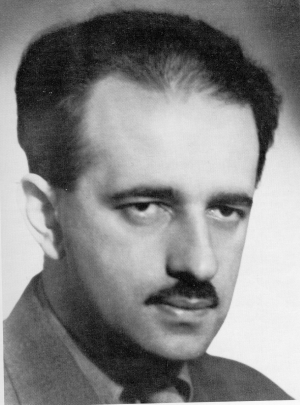|
"In Memoriam - Marvin Duchow."
Marvin Duchow, born on June 10, 1914, died last May 24 after a long illness. His association with McGill began in his student days. His first degree, a Bachelor of Music, was received from McGill in 1937. His subsequent studies took him to the United States where he obtained a Diploma in Composition from the Curtis Institute, a B.A. from New York University and an M.A. in musicology from the University of Rochester. Later on, while he was Dean of Music at McGill, Professor Duchow was honoured with a Doctor of Music (honoris causa) from Chicago Conservatory College.
Marvin began his teaching career at McGill in 1944. It was to teaching that he devoted the major part of h is energy for the next thirty-five years. Even while holding administrative posts, he continued with a heavy teaching load.
One of his former students, now a professor at a large university, recently said of him: "When I think the word 'teacher', I think of Marvin Duchow." He was as well-known to his students for his concern and kindness as he was for his thoroughness and his encyclopedic knowledge not only of music but of all aspects of history and culture. There was a legend in the Faculty that Marvin knew Gustave Reese's thousand page Music in the Renaissance completely from memory.
It was not only as a teacher but also as an administrator that Marvin contributed much to the musical life of McGill and the whole country. He served as Acting Dean and then Dean of the Faculty of Music during a most difficult eight-year period of the Faculty's history. He pushed through additional music programs in School Music and in Performance at a time when the administration was not particularly sympathetic to the idea of music degrees in the University. When he reluctantly agreed to the new Performance degree, former Principal James is reported to have remarked, "Well, I suppose that a certain degree of digital dexterity is required of a musician." Marvin was also frequently called upon to serve as a curriculum consultant for the other music schools in the Province.
Although he began his musical career as a composer, it was as a musicologist that Marvin did his major professional work. He was the foremost expert on the works and writings of Claude Champagne and made an important contribution to Canadian musical history with his cataloguing of Champagne'’ papers and works. In his research as in his teaching, he was known for he was known for h is thoroughness, attention to detail and his deep understanding of the issues involved.
In his last years, Marvin returned once again to composition. Like his scholarly writings, his musical compositions are notable for their clarity, fine craftsmanship and depth of expression. Of his own music he said, "I'm less interested in originality per se than I am in presenting a personal statement." His final personal statement came with the premiere last year of his last composition, Three Songs of the Holocaust. Although Marvin undoubtedly knew that he was dying when he wrote them, there is no note of self-pity in these songs. They are a moving evocation of the human spirit in the face of a tragic and inescapable destiny.
Such a man was Marvin Duchow, a man of great humility, dedication and warmth. With his death, McGill University and the whole Canadian musical community have suffered a great loss.
"In Memoriam - Marvin Duchow." (Reprinted with permission of the Faculty of Music, McGill University, from Music McGill 6 Autumn 1979: 5-6.)
|



